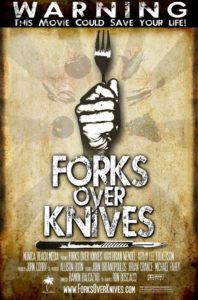The Argument
A raw food vegan friend of mine recently encouraged me to watch the documentary Forks Over Knives. The movie does a plant-based diet version of Super Size Me. By eating a whole food plant diet, the director loses and keeps off a lot of weight. His blood work shows that this eating style has erased all the bad numbers he used to have.
It does make a compelling argument.
The argument is plants are good; anything from an animal is bad. Yes, this includes dairy and eggs. The work is based on research done by MDs and PhDs. At the crux of the movie is the China Study (a book I haven’t read). Before China opened its doors to KFC and the western diet, it did a study on cancer in the country. What the study showed was that cancer types were clustered in different regions of China. Due to most of the diets being traditional at the time it showed the correlation between diet and cancer.
The film also pointed out the heart disease basically was nonexistent during the Nazi occupation of Norway. The Nazis, taking all the animal products for themselves, forced a plant-based diet on the Norwegians, causing a steep decline in heart-related diseases.
Finally, the film points to case studies showing the effectiveness of a whole food plant only diet in reducing cholesterol and triglyceride numbers as well as getting Type II Diabetes patients off of shots and pills.
Sidenote: Having a Type I Diabetic sister, I hate that when most people say Diabetes, they mean Type II. While related to how they affect the body, how both of them develop are entirely different. My sister weighed 110 pounds at 5’4″ when she developed Type I. In fact, no one is sure why she has it. Almost everyone who has Type II knows precisely how they got it. The idea that any diet can cure Type I Diabetes is dangerous and should be stomped out wherever you hear it.
The Flaws
The film does have a few flaws. First of all, using Nazis to prove something good is genuinely odd. Plus, can we trust the data from that time? I mean, by definition, it is skewed.
The China Study, as presented here, doesn’t look at other factors in what could have caused those cancers in those regions since China was industrial at the time of the study. Correlation doesn’t always mean causation.
Also, the opposite viewpoint was presented but never really challenged. Too often, the director could have asked a follow-up question and didn’t. The worse example of this was when the director of USDA claimed that the doctors that this film supports had a conflict of interest. While the film adequately showed that the USDA does indeed have a conflict of interest, his point of view wasn’t challenged. I feel the director was trying to show the USDA people as arrogant and pompous (and possibly corrupt). Asking the follow-up question would have put him on the spot to present facts.
Also, the other point of view shown was the people who totally support getting your protein from animals. What about Mark Bittman and Michael Pollan, who advocate less meat more plant diet? In Bittman’s case, as he states in Food Matters, his numbers went down basically the same amount as the director of Forks over Knives. How did he do it? By cutting meat down to one meal a day and then making it a condiment to the vegetables.
Finally, while all the patients make the case personal for the viewer, it can help but also come off as anecdotal. To create a fundamental change to our eating behavior as this movie calls for, it will need more. Saying the corporate structure of modern medicine will not allow it is a cop-out.
Verdict
That flaws I point out doesn’t mean it’s a bad movie or a bad for you movie. For me, the danger of any documentary is that it is propaganda for its thesis. I genuinely believe the underlying message of the film: eat plants. I know in my own case, following Bittman’s advice of trying to be vegan until 6, has worked wonders for me.
My numbers, except cholesterol (I ate horribly the two days before my test), are much lower than my first visit. Recently at a dinner party, we all tested our blood pressure (We know, we hang out with a wild bunch). My blood pressure was the lowest, which everyone attributed to my medicine. Actually, I hadn’t taken it that day or the day before due to forgetting. Again, this is anecdotal, but the movie does the same thing.
There is also no doubt, as the movie states, that our modern industrial farming methods are bad for both the animals and the environment. Plant subsidies throw this system of whack even further buy having us raise food for nonfood purposes (corn, I’m looking at you). The movie also does itself a service by instructing the audience to consult a doctor before you do a wholesale change in your diet.
So what will I do based on this movie? Well, I have already switched to a mostly whole food plant diet. I do try to be a vegan every day till six. However, I try to go meatless at least one full day. I can see myself increasing that to a couple of days which means the movie might not have met its goal, but is still successful.
By decreasing the number of animal products I consume, I can afford to buy higher quality meats. If this way doesn’t get my cholesterol down, then I will seriously consider giving up meat for most meals.
Yet, I cook too good of a steak to give that up meat forever.
About The Author
Discover more from NolaNerdCouple.com
Subscribe to get the latest posts sent to your email.


I recently watched Forks Over Knives as well. I agree with your assessment. I also just read Food Matters and thought it was a balanced approach. Congrats on the good health numbers! -Jill
Thanks! I really like how you are going to be unapologetic about going vegan. And as far as the criticism, if you can get your child to enjoy a plant based diet, who cares!